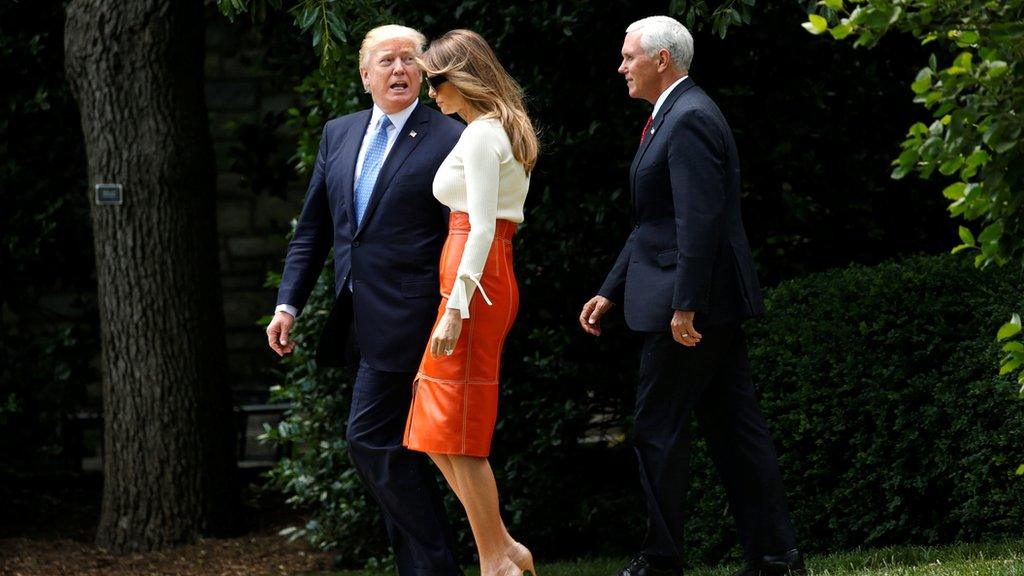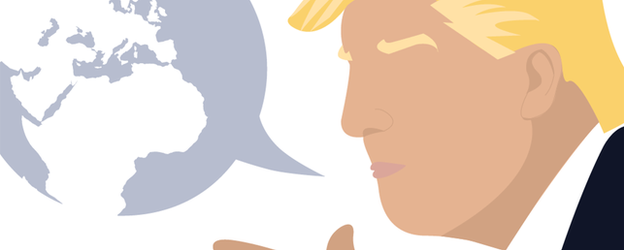Trump flies into geopolitical minefield
- Published

US President Donald Trump looks back toward his wife Melania and Vice-President Mike Pence as he departs the White House on Friday
President Donald Trump is off on his first foreign trip, while his aides seem in denial about the troubles dogging his White House.
He's been talking with advisers and revising a speech about Islam he's planning to give.
Some describe it as the "anti-Cairo speech", referring to President Barack Obama's address at Cairo University in 2009.
People I spoke to who know the president - when asked what they're most looking forward to about the trip - fall silent.
Trump's first trip: What's on the agenda in Saudi Arabia?
They mumble things about the way he's a homebody and doesn't like to be on the road.
Some were wondering aloud in the days beforehand whether the trip would even take place, given all the issues the president has been facing.
They make jokes about colleagues being investigated by a special counsel, while others laugh - sort of.
Mostly, though, they were acting as though neither the Russia investigations nor the controversy over his firing of the FBI director has happened.
"Watching this from the outside, it's pretty scary," said a former White House official who helped to arrange foreign trips for President Obama.
Adel al-Jubeir: Islam is 'part and parcel of the American social fabric'
"I can't fathom the chain of decision-making - or trying to be an advocate for what's going on."
For those who work in the White House, a foreign trip - even to one country - is one of the most challenging assignments they're given.
Mr Trump has an ambitious itinerary, and he's undertaking the journey with a skeleton staff, a group of people who have little or no experience in diplomacy.
The president and his aides will be trying to manage political developments in Washington and in cities abroad, and they'll be meeting people who are deeply suspicious of him and his "America First" foreign policy.
Aside from giving a speech in Riyadh, Mr Trump will visit Israel and try to smooth things over (some people in Jerusalem are upset about his reported disclosures to the Russians).
He'll go to the Vatican, and spend time in Brussels for a Nato meeting and in Sicily for discussions with G7 leaders.
"This is a nine-day minefield," said Dartmouth College's Daniel Benjamin, formerly the US State Department's top counterterrorism official.
"I just find it very hard to imagine how they pull this off without all kinds of trauma."
Former military officials agree.
"The administration is pretty unsettled - with scandal after scandal," said Pete Mansoor, an Ohio State University professor who knows several White House officials and used to work for General David Petraeus.
"My guess is it's been pretty difficult for the president to focus."
What matters, said Tom Karako, of the Center for Strategic and International Studies, is US policy towards the Middle East and Europe.
"There's a lot of noise right now," he said. "But the hard formulation of policy is what we need to judge."
Still, the flurry of activities at the White House has attracted attention - and has occasionally assumed a surreal quality.
Mansoor said that it reminded him of a YouTube, external video about a boy who's gone to the dentist and "is coming off the laughing gas, and he's saying: 'Is this real life?'"
Many of those working inside the White House, whether as aides, staffers or reporters, are wondering the same.
Follow @Tara_Mckelvey


Find out which foreign leaders President Trump has met or called since taking office, as well as the countries he has mentioned in his tweets.
